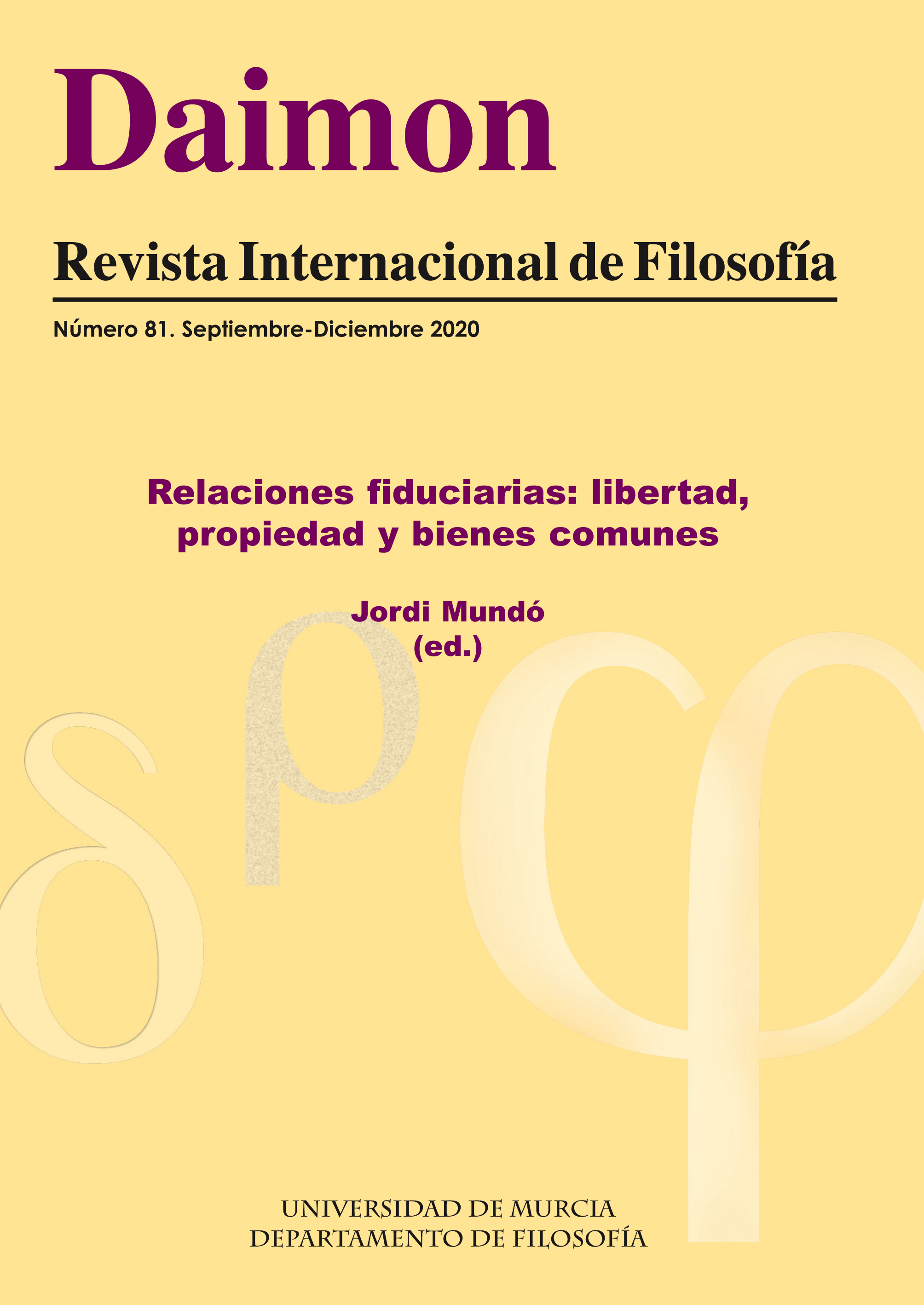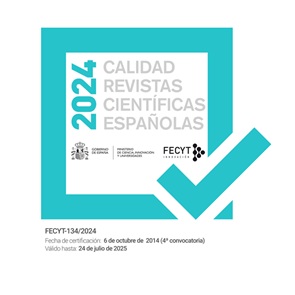Enemigo a las puertas. La libertad política y los principios fiduciarios en el socialismo británico
Resumen
El objetivo de este artículo es proporcionar algunas claves históricas y conceptuales para comprender la historia del socialismo británico libertarian y su relación con la concepción fiduciaria del poder político y del poder económico. Las expresiones de este socialismo no son homogéneas, convivieron con otras ideas rivales llegando en ocasiones a mezclarse con ellas; y fueron formuladas siempre como respuestas concretas ante los problemas que planteaba cada momento histórico. Desde el socialismo republicano de algunos seguidores de Robert Owen hasta los desafíos que planteó la New Left, las teorías fiduciarias encontraron hueco para abrirse paso en los escritos de estos socialistas libertarian.
Descargas
-
Resumen986
-
PDF625
Citas
Blaazer, D. (1992), The Popular Front and the Progressive Tradition. Socialists, Liberals, and the Quest for Unity (1884-1939), Cambridge: Cambridge University Press.
Boaz, D. (2020), «Libertarianism», en Encyclopaedia Britannica (online): https://www. britannica.com/topic/libertarianism-politics.
Cole, G. D. H. (1920), Guild Socialism Re-Stated, Londres: Parsons.
Cole, G. D. H. (1921), Self-government in Industry, Londres: G. Bell.
Cole, G. D. H. (1975a [1952]), Historia del pensamiento socialista. Vol. I. Los precursores, México D.F.: Fondo de Cultura Económica.
Cole, G. D. H. (1975b [1954]), Historia del pensamiento socialista. Vol. III. La segunda internacional, 1889-1914, México D.F.: Fondo de Cultura Económica.
Criddle, E. J. y Fox-Decent, E. (2018) «Introduction», en Fiduciary Government, Cambridge: Cambridge University Press, pp. 1–17.
Díez del Corral, L. (1956), El liberalismo doctrinario, Madrid: Instituto de Estudios Políticos.
Domènech, A. (2019), El eclipse de la fraternidad. Una revisión republicana de la tradición socialista, Madrid: Akal.
Dryzek, J. S., Bonnie, H. y Phillips, A. (eds.), Oxford Handbook of Political Theory, Oxford: Oxford University Press.
Dunn, J. (1968), «The Identity of the History of Ideas». Philosophy, 43(164), pp. 85–104. Dunn, J. (1984), The Politics of Socialism. An Essay in Political Theory, Cambridge: Cambridge University Press.
Dworking, D. (1997), Cultural Marxism in Postwar Britain. History, the New Left and the Origins of Cultural Studies, Durham: Duke University Press.
Epstein, J. (1989), «Understanding the Cap of Liberty: Symbolic Practice and Social Conflict in Early Nineteenth-Century England», Past & Present, 122, pp. 75–118.
Estlund, D. M. (2008), Democratic Authority. A Philosophical Framework, Princeton: Prin- ceton University Press.
Foote, G. (1997), The Labour’s Party Political Thought, Londres: Macmillan Press.
Goodway, D. (2006), Anarchist Seeds beneath the Snow. Left-Libertarian Thought and British Writers from William Morris to Colin Ward, Liverpool: Liverpool University Press.
Gourevitch, A. (2014), From Slavery to the Cooperative Commonwealth, Cambridge: Cambridge University Press.
Hall, S. (2010), «Vida y momentos de la primera nueva izquierda», New Left Review (Segunda Época), 61, pp. 163–182.
Hobsbawm, E. J. (2002), Interesting Times. A Twentieth-Century Life, Nueva York: Pantheon Books.
Kennedy, G. (2013), «Freemen, Free Labor, and Republican Discourses of Liberty in Early Modern England. Contributions to the History of Concepts», 8 (2), pp. 25–44.
Kenny, M. (1995), The First New Left. British Intellectuals after Stalin, Londres: Lawrence & Wishart.
Laski, H. (1917), Studies on the Problem of Sovereignty, New Haven: Yale University Press.
Laski, H. (1921), The Foundations of Sovereignty, and other Essays, Nueva York: Harcourt, Brace & Company.
Laski, H. (1925), Socialism and Freedom (Fabian Tract), Londres: Fabian Society.
Laski, H. (1938 [1925]), A Grammar of Politics, Londres: Billing & Sons Ltd. MacGilvray, E. (2011), The Invention of Market Freedom, Cambridge: Cambridge University Press.
Mack, E. (2011). «Libertarianism», en The Oxford Handbook of the History of Political Philosophy, Oxford: Oxford University Press, pp. 1–18.
Marshall, P. H. (1998), Demanding the Impossible. A History of Anarchism, Londres: Harper Perennial.
McCann, G. (1997), Theory and History. The Political Thought of E. P. Thompson, Aldershot: Ashgate.
Miliband, R. (1964), Parliamentary Socialism. A Study in the Politics of Labour, Nueva York: Monthly Review Press.
Miliband, R. (1977), Marxism and Politics, Oxford: Oxford University Press.
Morris, W. (2013), The Collected Works of William Morris. Vol. 23, Cambridge: Cambridge University Press.
Mundó, J. (2005), «Autopropiedad, derechos y libertad», en: Bertomeu, M. J. et al. (eds.), Republicanismo y democracia, Buenos Aires: Miño y Dávila, pp. 187–208.
Pettit, P. (1999), Republicanismo: una teoría sobre la libertad y el gobierno, Barcelona: Paidós.
Pettit, P. (2004), «Liberalismo y republicanismo», en Ovejero, F., Martí J. L. y R. Gargarella, R. (comps.), Nuevas ideas republicanas. Autogobierno y libertad, Barcelona: Paidós, pp. 115-135.
Pocock, J. G. A. (1971), «Languages and Their Implications. The Transformation of the Study of Political Thought», en Politics, Languages and Time. Essays on Political Thought and History, Chicago: University of Chicago Press, pp. 3–41.
Rothbard, M. N. (2007), The Betrayal of the American Right, Auburn: Ludwig von Mises Institute.
Screpanti, E. (2007), Libertarian Communism. Marx, Engels and the Political Economy of Freedom, Basingstoke: Palgrave (MacMillan).
Shaw, G. B. (1893), The impossibilities of anarchism (Fabian Tract), Londres: Fabian Society.
Sprading, C. T. (1913), Liberty and the Great Libertarians, Los Ángeles: Golden Press.
Standing, G. (2018), La renta básica: un derecho para todos y para siempre, Barcelona: Pasado y Presente.
Stekloff, G. M. (1928), History of the First International, Londres: Martin Lawrence Lt.
Stevenson, S. W. (1889), A Dictionary of Roman Coins. Republican and Imperial, Londres: George Bell and Sons.
Thompson, D. (1996), «On the Trail of the New Left», New Left Review, 1(215), pp. 93–100.
Thompson, E. P. (1978), The poverty of theory and other essays, Londres: Merlin Press. Thompson, E. P. (1979), «Recovering the libertarian tradition», Leveller Magazine, 22, pp. 20–22.
Thompson, E. P. (1980), Writing by the Candlelight, Londres: Merlin Press.
Thompson, E. P. (1988), William Morris. De romántico a revolucionario, Valencia: Ediciones Alfonso el Magnánimo.
Thompson, E. P. (1994), E. P. Thompson. Persons and Polemics, Londres: Merlin Press.
Thompson, E. P. (2012 [1963]), La formación de la clase obrera en Inglaterra, Madrid: Capitán Swing.
Thompson, E. P. (2016), E. P. Thompson. Democracia y socialismo, México, D.F.: Universidad Autónoma de México.
Torr, D. (1956), Tom Mann and his Times, Londres: Lawrence & Wishart.
Trenchard, J. y Gordon, T. (2018 [1720-1723]), Cartas de Catón, Madrid: Agencia Estatal. Boletín Oficial del Estado.
Wolfe, D. M. (1944), Leveller Manifestoes of the Puritan Revolution, Londres: Thomas & Nelson Sons.
Las obras que se publican en esta revista están sujetas a los siguientes términos:
1. El Servicio de Publicaciones de la Universidad de Murcia (la editorial) conserva los derechos patrimoniales (copyright) de las obras publicadas, y favorece y permite la reutilización de las mismas bajo la licencia de uso indicada en el punto 2.
2. Las obras se publican en la edición electrónica de la revista bajo una licencia Creative Commons Reconocimiento-NoComercial-SinObraDerivada 3.0 España (texto legal). Se pueden copiar, usar, difundir, transmitir y exponer públicamente, siempre que: i) se cite la autoría y la fuente original de su publicación (revista, editorial y URL de la obra); ii) no se usen para fines comerciales; iii) si remezcla, transforma o crea a partir del material, no podrá distribuir el material modificado.
3. Condiciones de auto-archivo. Se permite y se anima a los autores a difundir electrónicamente las versiones pre-print (versión antes de ser evaluada) y/o post-print (versión evaluada y aceptada para su publicación) de sus obras antes de su publicación, ya que favorece su circulación y difusión más temprana y con ello un posible aumento en su citación y alcance entre la comunidad académica. Color RoMEO: verde.











